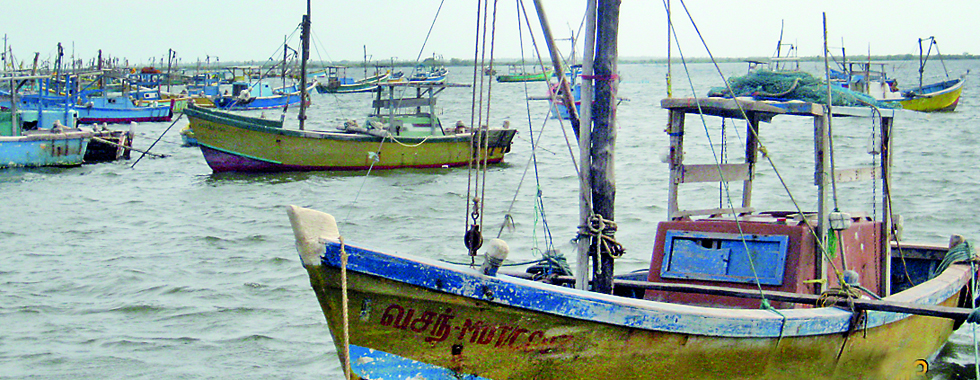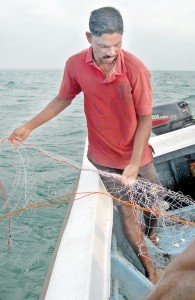News
Twin tussle over trawling: Sri Lanka’s traditional fishermen caught in the net
The newly elected leaders of India and Sri Lanka renewed their governments’ commitment to resolving the fishing dispute between the two countries when they met in New Delhi last week. Another round of fishermen-to-fishermen talks, as announced by India at the end of the talks, will, however, not lead to a solution.
The last round of talks between Sri Lankan and South Indian fishermen held in Colombo in March last year ended almost before it began. Sri Lankan fishermen’s representatives refused to budge from their position that “illegal fishing by South Indian trawlers in Sri Lankan waters should stop, forthwith.” No withdrawal period. No transition phase. No further excuses or delays. Indian fishermen’s representatives were told politely to stop fishing illegally in Sri Lankan waters. Speaking to Northern Province fishermen last week, I found that the position has not changed.

Sri Lankan vessels in the Gurunagar fishing port
The economic hardship caused to the people of the northern coast and the damage done to Sri Lanka’s marine environment by Indian fishermen are undisputed facts. Governments and fishing communities on both sides of the Palk Bay accept that mechanised bottom-trawling in Sri Lankan waters is unacceptable. Northern Province Chief Minister C.V. Wigneswaran pledged his support to the province’s fishermen prior to President Maithripala Sirisena’s departure to New Delhi. The Chief Minister called upon the Sri Lankan government to take sterner action against illegal fishing by Indian trawlers.
Yet, as was evident from protests by fishermen in Mannar this week, illegal trawling by Indian trawlers off the coast of Mannar continues unchecked. Despite a reasonable understanding of the Tamil Nadu political and economic factors that drive the Indo-Sri Lankan fishing dispute, nothing beyond dialogue is being offered from the Indian side to bring the dispute to an end.
Sri Lanka’s own ‘trawling dispute’
While the focus is on the fishing dispute with Indian fishermen, a lesser known but an equally a serious problem is the threat posed to Sri Lanka’s traditional fishermen by Sri Lanka’s own mechanised trawler owners. According to Joseph Francis, president of the Poonakary Fishermen’s

A Si Lankan fisherman attending to his net
Cooperative Society Union, the problem erupted again last month soon after the presidential election. Since the middle of January, fishing communities along the Poonaryn coast have been asking: “Who gave permission to the Jaffna-based trawler owners to resume trawling?”
There are around 350 mechanised trawlers in Sri Lanka. Each 28ft-3½ ton vessel is fitted with a small mesh trawl net. Some 180 of these vessels operate from Gurunagar in Jaffna (see picture). The remainder of the fleet can be found in Mannar, Kalpitiya and Uswattekettiyawa. These vessels were introduced to Sri Lanka in the 1960s. Designed by Eric Eslander they are powered by 24-28 Hp two cylinder marine diesel engines. These vessels were originally designed and used for a range of fishing operations including drift netting, long-lining, handling, tolling, poll and line, lure fishing and prawn trawling. The decline in near-shore fish stocks since the 1970s indicates that these boats are now used sporadically — only to trawl for prawns.
Mechanised bottom trawling is not a prohibited fishing method in Sri Lanka, outside of lagoons, estuaries and other ‘inland waters’. However, it is generally accepted that fishing operation licences are not issued by the Department of Fisheries and Aquatic Resources for mechanised trawlers. Without an operations licence mechanised trawling is illegal in Sri Lanka: All fishing gear used to harvest fish must be licenced by the department.
As was quickly discovered in the ‘60s and ‘70s, mechanised trawling and traditional fishing methods of using fixed or drifting nets are incompatible. You either trawl or net in a given area. You can’t do both. If traditional fishermen set their nets in fishing grounds where trawlers also fish, they risk their nets being ripped in half or worse, snagged and dragged tens of kilometers away. Poor fishermen will have to spend hundreds of thousands of rupees to buy new nets.
Since the beginning of this month, about 900 traditional fishermen from the Poonaryn coastal area have not gone fishing on Monday, Wednesday and Saturday nights: the nights when the Jaffna trawlers are expected. As a result, about 900 families are without income for three days of the week. Seafood companies in the area are telling their staff not to come to work the day after the trawlers go out fishing. According to fishermen, the daily catch is less than expected for the time of the year. The blame is hooked onto Sri Lankan trawlers that churn up the sea bed and damage marine resources.
The previous government took a strong stand against poaching by Indian trawlers and enforced measures to prevent Jaffna trawlers from disrupting the livelihoods and damaging the resources of Kilinochchi fishermen. Yesterday evening the Jaffna trawlers were out trawling again. While you are reading this, the trawlers will be unloading their catch in Gurunagar. Despite fisher leaders’ questions, no one knows who gave permission to the Jaffna trawlers to resume trawling? And if permission hasn’t been given, why is nothing being done to safeguard the livelihoods and protect the resources of Kilinochchi fishermen?
Mechanised bottom trawling in tropical, multispecies fisheries creates multiple problems. An amendment to the Fisheries Act prohibiting mechanised trawling in Sri Lanka is needed to resolve the dispute between Sri Lankan fishermen. Existing legal instruments embodied in Sri Lanka’s Foreign Fishing Vessel Act are sufficient to deter Indian trawlers from entering Sri Lankan waters. The new government simply needs to implement them. Talking is not enough.
(The writer is a Fisheries Specialist and Freelance Consultant who has worked on this issue for the past 15 years)

